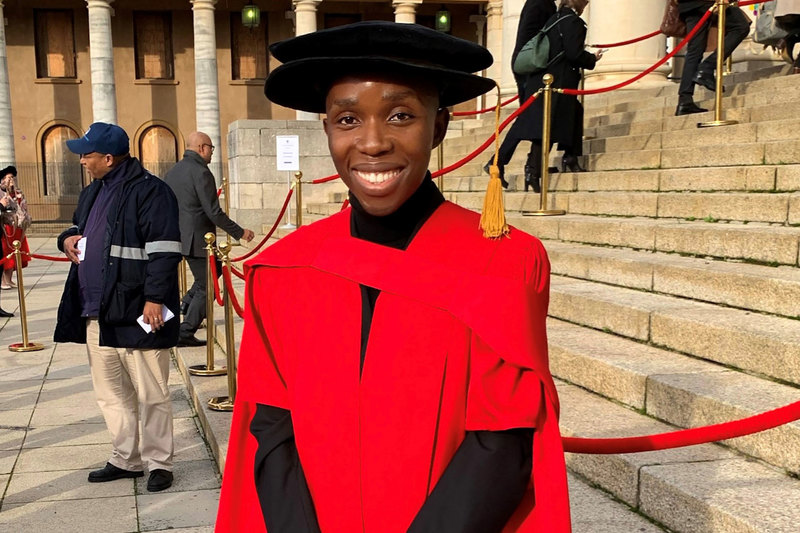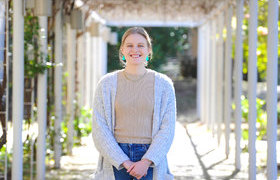LLM to PhD – Thapelo Teele’s inspirational journey
22 August 2023 | Story Nicole Forrest. Photo Supplied. Read time 9 min.
Just a year after registering for his LLM at the University of Cape Town (UCT), Dr Thapelo Teele’s dissertation was upgraded to a PhD. In the two short years since, Dr Teele has successfully completed his doctoral thesis and been awarded a PhD in legal rhetoric studies – a rarely seen feat and one of the many reasons Thapelo is one of this year’s inspirational graduates.
He humorously describes himself as a “professional motivational letter writer”. Speaking with him, however, adjectives like intellectual, down-to-earth, optimistic, effervescent and determined are far more likely to come to mind.
Growing up between South Africa and Lesotho – and having a father in the legal profession – in his early years gave Thapelo the impetus to study law. This, he said, came from the benefit of being able to see the world through a multitude of lenses and understand that the law affects almost every aspect of our lives.
“I grew up in both countries, and having seen those different perspectives formed a lot of my understanding of how the world works. There was also the matter of seeing how pervasive the law is in our lives. Just the process of moving between countries requires a passport, which is a legal document, even though we might not think of it as such,” he said.
“So, without really realising, I always knew that the law permeates every aspect of our lives – whether we’re aware of it or not. Of course, it also helped that my father is a legal practitioner, because I could see from a very real perspective what it looked like to operate within the realm of the law.”
Academic ups and downs
When it came to tertiary education, he was somewhat hesitant to follow the path of legal studies. He chose instead to enrol in a Bachelor of Arts (BA), diving into history, sociology, political science and English literature. However, all roads seemed to lead to the law.
“I initially applied for my BA and thought I was going to do law as a combined course in my second year, but I was a little scared. So, I thought to myself, ‘It’s fine, you’ll do it at a later stage.’
“I kept putting it off, but I felt more and more drawn towards it. In one way or another, I always got the inclination of the fact that the law had something or other to do with a lot of the content that I was engaging with,” he said.
Graduating with his BA in 2014, Thapelo applied and was accepted to the postgraduate LLB programme. Amidst a variety of academic and social challenges, what was slated to be a three-year course took the young academic five years to complete.
“That academic exclusion and appeal process was so deeply important to where I find myself at this point in time.”
“It was supposed to be three years, but it actually took me five years because the transition was quite challenging for a number of reasons. On one hand, it was a very different way of thinking that I had to adapt to. On the other, we had the beginning of the Fees Must Fall uprising, which caused quite a bit of disruption in the academic calendar,” he explained.
Unfortunately, the pressures of law school and initial difficulties with keeping up academically meant that Thapelo found himself being academically excluded in 2018. Rather than become discouraged, the perceived failure only served to steel his resolve to complete his LLB – and give him the tools he needed to continue studying towards his PhD.
“I must acknowledge that I struggled quite a bit and failed a couple of courses, to the point that, in 2018, I was actually academically excluded from law school. Fortunately, I had the opportunity to appeal that and apply for readmission.
“It was interesting, because without realising it, that academic exclusion and appeal process was so deeply important to where I find myself at this point in time. It essentially entailed collecting data and evidence and writing a motivational letter defending myself. So, it was helping to sharpen the skills that I’d need for the profession I’d eventually get into.”
A turning point to triumph
While readmission was an “emotional roller coaster”, the process served as a turning point for Thapelo. Having formed good relationships with many of his professors, in part due to “repeating some of their courses”, the young lawyer’s final year was one of his best.
“My final year was 2019 and it was really a phenomenal year for me. I had a wonderful lecturer, Professor Jaco Barnard-Naudé, who knew my love for research and let me know about an opportunity to attend a summer school in Paris hosted by the University of Kent.
“Much like the readmission process, I had to write a motivation to get in. And I succeeded. When I got there, I was incredibly academically challenged. I was the most academically junior and it made me realise that I need to pick up my game. I need to read more, and I need to immerse myself in research more if I want to stand out as a researcher,” he said.
“This is it. This is the end of my academic career.”
Upon returning to UCT, Thapelo enrolled for a course centred on post-apartheid literature. With a background in English literature from his undergraduate degree, he was confident in his abilities. However, when it came time to hand the essay in, his confidence faltered.
“I wrote the essay and I thought it was terrible. Absolutely horrible. I thought that it was probably one of the worst pieces of work I’d ever created in all of my years at university – which at that point was seven,” he explained.
“I got a call from a number I didn’t know, so I didn’t answer it. When I googled it later, I saw that it was Professor Barnard-Naudé and I remember thinking, ‘This is it. This is the end of my academic career.’ I thought, ‘It’s that horrible assignment I submitted. It’s probably plagiarism and I’m probably going to have to go for a disciplinary hearing.’”
However, as it so often goes in these situations, that essay would turn out to be the piece that would set Thapelo on the path to academic excellence. Contrary to his intrusive thoughts, Barnard-Naudé had contacted Thapelo to let him know that the piece was, in fact, one of the most outstanding pieces of work he had ever received from an undergraduate student.
It takes a village
That “terrible” piece of writing became his impetus for pursuing his master’s degree and then his PhD in rhetoric studies. The former under the co-supervision of Barnard-Naudé and Distinguished Professor Philippe-Joseph Salazar, and the latter under the highly celebrated and accomplished Professor Salazar.
Again, the budding academic’s path would be a winding one, with his supervisor transferring to another university during the course of his LLM and the onset of the COVID-19 pandemic coming shortly after he had converted to a PhD.
Despite these challenges, Thapelo was able to secure two fully funded scholarships provided by the AW Mellon Foundation and was awarded his doctorate in record time. An achievement that he says is in no small part due to the “village” of people he has surrounded himself with.
“My parents have been so patient and supportive, even in moments when they didn’t quite see the vision.”
“One cannot deny the importance of having a village. From the administrative staff at UCT to the lecturers, to librarians and everyone else who has assisted me and helped me do everything from refining my ability to research to fill out funding forms correctly, they have been phenomenal.
“Then there’s obviously my family. My parents have been so patient and supportive, even in moments when they didn’t quite see the vision. My friends – even those who graduated and left me while I was still at law school – have helped me to keep going and stay confident in situations where my confidence could have been destroyed,” he said.
In addition to building a close-knit community around himself, Thapelo acknowledges that seeking support from a therapist and looking to God in times of difficulty have been instrumental in helping him to reach the heights he has.
For those who are looking to make the most of their studies and achieve academic excellence, he advises taking advantage of the world-class resources provided by UCT, cultivating resilience and keeping curious.
 This work is licensed under a Creative Commons Attribution-NoDerivatives 4.0 International License.
This work is licensed under a Creative Commons Attribution-NoDerivatives 4.0 International License.
Please view the republishing articles page for more information.










